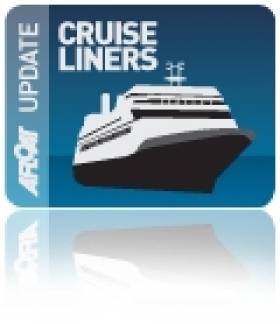Displaying items by tag: Jewel of the Seas
Cruiseships Head for Cobh in advance of Queen Elizabeth
The 2,500 passenger Jewel of the Seas has a nine-deck centrum which has glass lifts which allows light to flow throughout the spacious and airy ship. Activities range from golf to climbing, a spa and sumptuous restaurants.
When the 2004 built cruiseship docks at the dedicated cruise berth at Cobh in the early hours of tomorrow she will also be sharing the deepwater berth with the 2001 built Silver Whisper. The ultra-luxury vessel accommodates only 388 passengers and is operated by SilverSeas Cruises. To read more about the vessel click HERE.
Both vessels are scheduled to depart Cobh around teatime tomorrow and this will be followed by preparations of the picturesque town which is to welcome the maiden call to Cobh of Queen Elizabeth on Saturday. To read more about the newest vessel of the Cunard Line fleet click HERE. The 2010 built vessel will firstly make an inaugural call to Dublin on Friday prior to the Cobh call which coincides with Cork Harbour Open Day, for event details visit www.corkharbour.ie
























































